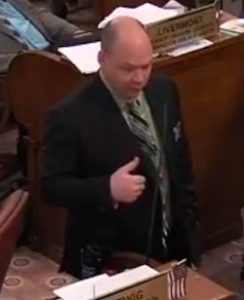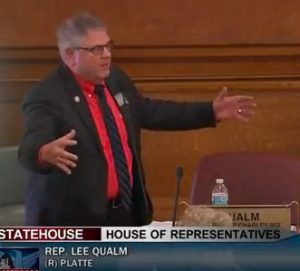The House passed HB 1184, the CAFO poopline bill, Tuesday on a 45–20 vote. True to his word, my Representative Drew Dennert reversed his mistaken committee vote and called Nay on the House floor, as did his District 3 partner Representative Dan Kaiser.
However, the Republican majority (just one Democrat, Rep. Spencer Hawley from Brookings, joined the anti-property rights poopyheads) said relieving concentrated animal feeding operations of the burden of negotiating with their neighbors for permission to dispose of their overflowing waste is hunky-dory.

And interestingly, prime sponsor from CAFO-Land, District 4’s Rep. Jason Kettwig, avoided making that point.
Right now, CAFO owners wishing to drain their overflowing lagoons of cow poop—excuse me: “animal nutrients,” as Rep. Kettwig repeated throughout his floor speech—have two options: haul it out by trucks (two million gallons require over a hundred big, heavy truck trips, usually in the spring, putting wear and tear on public roads, a fair point for debate) or pump it out by long hoses across neighbors’ land to to the fields where the manure is applied as fertilizer. Naturally, if you want to run a hose across your neighbor’s land, you need to get your neighbor’s permission, and naturally, in a free market that respects private property rights, if you want to lay a hose across my yard for two to seven days, I’ll expect you to move some green into my hand before you move two million gallons of brown across my yard.
In short, poop won’t flow if I say no.
By allowing CAFO owners to lay their pooplines in the ditch, just like public utilities, HB 1184 removes the need to dicker with and pay any landowners. Rep. Kettwig admitted his bill will save CAFO owners money. But he would not admit that HB 1184 removes private landowners’ ability to block pooplines from putting their property at risk. Representative Elizabeth May (R-27/Kyle) said in floor debate that HB 1184 feels like eminent domain to her, allowing private CAFO owners to take other landowners’ property without compensation. Rep. Kettwig said crying “eminent domain” is a “stretch” and offered a fuzzy statement about how the county commission would regulate the pooplines and give property owners who object to hosting pooplines the “opportunity to voice those things.” He gave examples of regulations the counties “could” impose, but no such regulations are in HB 1184. The simple effect of HB 1184 is that it removes the final say landowners have now over whether or not CAFO pooplines put their land at risk.
Rep. May recognized that. Rep. Julie Frye-Mueller recognized that problem and said that her conversations with pumpers tell her that manure disposal is better handled between CAFOs and their neighbors. Rep. John Mills sided with Frye-Mueller and landowners over his District 4 seatmate, saying that CAFOs already work with their neighboring landowners and that such negotiations are superior to county rules that cut landowners and even township boards out of the process.

Rep. Lee Qualm poo-pooed concerns about property rights and leaks, saying that a spill would benefit landowners by providing “a patch where actually the grass grows better.” He said it makes more sense to pipe the poop through ditches that nobody else is using in the spring than destroy the county roads by trucking it.
I understand the practical point for CAFO operators: their business produces an enormous amount of waste. We should look for ways to dispose that waste cost-effectively that do the least damage to public infrastructure, natural resources, and private property.
But your neighbor’s decision to start a business that produces a lot of waste does not oblige you to surrender some portion of your property to help your neighbor dispose of that waste more cheaply. Lack of planning on your neighbor’s part does not constitute on an emergency on yours.
But Qualm, like the other proponents, did not touch the salient property-rights point: HB 1184 takes away rights that landowners have right now to appease CAFO owners who didn’t fully account for manure disposal costs in their business plans, to which the proper response is, “Tough animal nutrients!”
44 Republicans and 1 Democrat chose the opposite response and voted Tuesday to take those landowner rights away. It now falls to Senate Transportation (bill not scheduled yet) to resist this assault on private property rights and continue making CAFO owners play by free market rules and negotiate with their neighbors for the right to use their land.
Rep Lee Qualm…. you are mistaken. A manure leak or spill from one of those lines will fry any vegetation that it comes in contact with. And usually when leaks happen its not just a drip, thousands of gallons can be spilled before the operator even notices nothing is coming out of the pipe at the tractor. I suppose you could call this a form of noxious weed control….
And most importantly, all ditches drain downhill.
Pipelines are a good way to transport the stuff, but we need regs to limit the damage that bad managers can do, not grant cart blanch to do whatever…
As a rural landowner the deed for my property says I own the land to the center of the right of way, the county assesses taxes to the center of the right of way even if there is a county or township road on that right of way. Those rights of way were established by the Land Ordinance of 1785 to allow access to parcels of land in the old Northwest Territory. I am confident that when the Congress passed that law 233 years ago they intended those rights of way to allow travel and would never have conceived of temporary manure pipelines. In my part of the state most of those rights of way are unimproved section lines, if some corporation wants to lay a pipeline across my land on or off the right way they can come talk to me and we will come to some sort of agreement that includes an adequate monetary settlement for the right to do more than travel down a right of way.
Thanks for that point about a manure leak, David! It’s one thing to spread that manure around a field; it’s another to have a whole bunch pooled in one concentrated area!
Maybe CAFO owners could alleviate all that road damage by developing poop drones. Surely nothing could go wrong there….
You get an tarsands sludge line forced on you and where does it end?
I can vouch that liquified hog concentrate from CAFO pits is HOT with nitrogen and if sprayed on green foliage, kiss that green goodbye for the year.
in dorky iowa these cafos aren’t allowed to be built without proof they have enough cropland available to handle all the waste that is produced every year. Sounds like common sense to me, but what do I know. I am an iowan.
If constituents began shipping cow patties to Representative Qualm, he’d calmly slip them into his briefcase and take them home to spread around his yard.